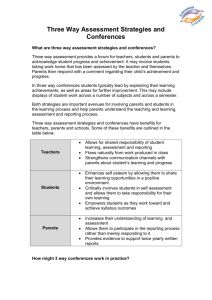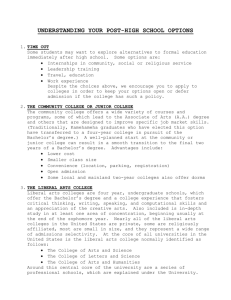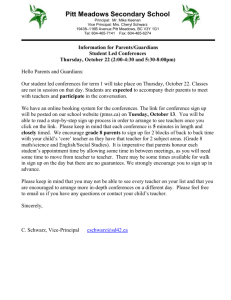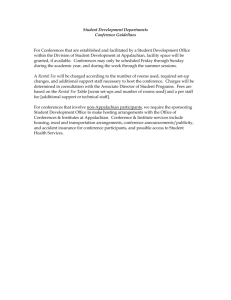The Washington & Jefferson Center for Energy Policy and
advertisement
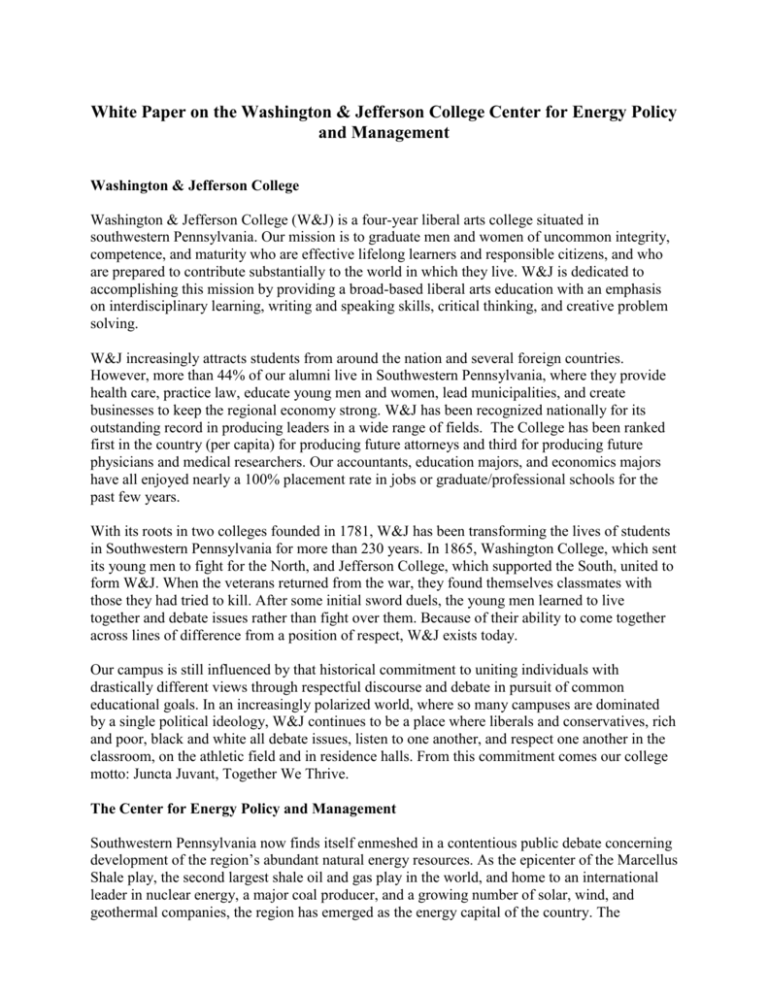
White Paper on the Washington & Jefferson College Center for Energy Policy and Management Washington & Jefferson College Washington & Jefferson College (W&J) is a four-year liberal arts college situated in southwestern Pennsylvania. Our mission is to graduate men and women of uncommon integrity, competence, and maturity who are effective lifelong learners and responsible citizens, and who are prepared to contribute substantially to the world in which they live. W&J is dedicated to accomplishing this mission by providing a broad-based liberal arts education with an emphasis on interdisciplinary learning, writing and speaking skills, critical thinking, and creative problem solving. W&J increasingly attracts students from around the nation and several foreign countries. However, more than 44% of our alumni live in Southwestern Pennsylvania, where they provide health care, practice law, educate young men and women, lead municipalities, and create businesses to keep the regional economy strong. W&J has been recognized nationally for its outstanding record in producing leaders in a wide range of fields. The College has been ranked first in the country (per capita) for producing future attorneys and third for producing future physicians and medical researchers. Our accountants, education majors, and economics majors have all enjoyed nearly a 100% placement rate in jobs or graduate/professional schools for the past few years. With its roots in two colleges founded in 1781, W&J has been transforming the lives of students in Southwestern Pennsylvania for more than 230 years. In 1865, Washington College, which sent its young men to fight for the North, and Jefferson College, which supported the South, united to form W&J. When the veterans returned from the war, they found themselves classmates with those they had tried to kill. After some initial sword duels, the young men learned to live together and debate issues rather than fight over them. Because of their ability to come together across lines of difference from a position of respect, W&J exists today. Our campus is still influenced by that historical commitment to uniting individuals with drastically different views through respectful discourse and debate in pursuit of common educational goals. In an increasingly polarized world, where so many campuses are dominated by a single political ideology, W&J continues to be a place where liberals and conservatives, rich and poor, black and white all debate issues, listen to one another, and respect one another in the classroom, on the athletic field and in residence halls. From this commitment comes our college motto: Juncta Juvant, Together We Thrive. The Center for Energy Policy and Management Southwestern Pennsylvania now finds itself enmeshed in a contentious public debate concerning development of the region’s abundant natural energy resources. As the epicenter of the Marcellus Shale play, the second largest shale oil and gas play in the world, and home to an international leader in nuclear energy, a major coal producer, and a growing number of solar, wind, and geothermal companies, the region has emerged as the energy capital of the country. The collective growth of all of these industries has a strong bearing on our communities, drawing new labor forces to the area, adding drivers to the roads and students to the schools, as well as increasing the demands placed on our natural environment. As a result, there are strongly divided opinions within the region about how these energy resources should be developed and used. Careful policy development is needed to ensure that these divergent views are reconciled and emerging energy industries can prosper. Policy-making is the means by which democratic societies negotiate change, especially when that change is contentious. The Center for Energy Policy and Management (CEPM or Center) at W&J intends to fulfill this important need by bringing together individuals from energy industries (fossil fuels, as well as solar, wind, geothermal, and nuclear), environmental scientists, and key policymakers in a fact-based, unbiased environment to help craft regional and national policies that will promote energy growth while preserving the quality of the environment. Many local colleges and universities have established programs related to the growing Marcellus Shale industry. Some community colleges are training roustabouts; other schools have set up research centers; and still others are training energy engineers. However, none are focusing on policy as the vehicle whereby the needs of industrial growth and environmental impact mitigation are negotiated, whether the issue is the impact of wind turbines on migratory birds or the impact of fracking fluids on water quality. Yet both environmental scientists and industry leaders point to clear, consistent policy as their most important need. Whereas large universities often establish centers for excellence that draw attention to areas of particular expertise within the institution, a center for excellence at a small liberal arts college can have a different function. The CEPM is well situated to act as a convener, bringing together individuals from a variety of fields and with different kinds of expertise as needed to explore a given issue. The Center will draw upon W&J’s experts and researchers as well as those from other colleges and universities in the area and those working for corporations and policy groups. In this way, the Center’s perspective and interests will not be limited by affiliation with a particular school or department of a university that might seek to "own" it and so dominate the conversation. Furthermore, policy-making and industry management require the kind of complex, multidisciplinary problem-solving that epitomizes a liberal arts education. W&J's identity as a liberal arts college and its historic strengths in science, law, and business make it an appropriate host for a center focused on energy policy and energy management. For more than two centuries, W&J has been the leading liberal arts college in the region, a place where individuals with divergent opinions could engage in fact-based, respectful, and hence productive dialogue. The Center for Energy Policy and Management is an expression of that continuing leadership. As a convener, the Center for Energy Policy and Management does not advocate a particular agenda, but, rather acts as a facilitator to bring individuals together to sort through scientific, economic, and sociological analyses of the energy industry in order to craft the best policies to secure America's energy future and its environmental health. When specific policy recommendations emerge from these discussions, the Center will facilitate their promotion and dissemination by the participants at conferences it will host. With policymakers involved in these discussions, there will be natural routes to placing policy on legislative agendas as appropriate. 2 With its focus on all energy industries--not just fossil fuels--W&J's Center for Energy Policy and Management is interested in broad policy questions like, "Should we be developing compressed natural gas-fueled or electric cars or both or neither?" "What role will coal play in the tapestry of energy sources needed to fuel our country?" as well as specific concerns like "What best practices exist for protecting the environment at natural gas drilling sites? How should these practices be promoted and/or enforced?" In sum, the Center is designed to: • Provide an opportunity for scientists, industry members, legislators, and citizens to exchange information about energy policy and energy management in a fact-based, constructive way, • Educate the public about policy issues related to traditional and non-traditional energy sources, • Provide a place outside of the media spotlight where policy issues can be discussed openly and constructively in order to promote industry growth and energy security, while minimizing impact on the environment, • Advance research on policy and management issues related to energy, • Provide a benchmark to track progress toward energy independence and security, and • Bring experts in the fields of energy policy and energy management to the region. Structure and Activities of the Center The structure of W&J Center for Energy Policy and Management is designed both to connect it with the region and to allow it to maintain an unbiased position. The Center is operated by a Director who reports to the president of the College and is guided by an Advisory Board. The Advisory Board consists of a diverse group of professionals with expertise in energy-related fields. The Advisory Board meets quarterly and its members are also available for consultation on a regular basis so as to provide guidance to the CEPM Director concerning the Center's activities and any issues it encounters. The Board members recommend activities for the Center to undertake, assist with planning and shaping conferences, help to assess the need for and structure of post-baccalaureate energy programs, and connect the Center’s director to industry, non-profits, scientists, and policymakers. The W&J president serves ex officio on the Advisory Board. The Center for Energy Policy and Management will accomplish its goals and objectives by supporting several different activities. These include: Generation and Publication of the W&J Energy Index The W&J Energy Index draws data from publicly available or objective sources (e.g., the U.S. Energy Information Administration) to create a benchmark for measuring the energy 3 independence and energy security of the United States. While the balance of imported and domestic sources within the different energy sectors is a key factor in the Energy Index, the Index also considers the diversity of our import partners and the political stability of each importing country. The Energy Index is sufficiently robust to be meaningful and responsive to changing socio-political and economic situations, but it also is straight-forward enough to be well understood by those who rely upon it. While the data comes from outside sources, the Index's core algorithm is proprietary and owned by W&J. The algorithm has also been used to analyze the energy independence of the various regions of the U.S. This benchmark will be issued annually to public media at an Energy Summit in order to assist the media, the public, and policy makers with tracking the country's progress toward energy independence and security. Throughout the year, interpretative data from the Energy Index will be released to the public. Public Conferences, Institutes, and Forums Concerning Energy Policy and Management The Center for Energy Policy and Management brings people together in conferences, institutes, and public forums to address the complex issues of energy development and consumption and to educate the public on energy-related issues. Some of these conferences are organized by the Center itself and others are simply hosted by the Center. In all cases, every effort is made to ensure that the discussions at these events are fact-based, respectful, and constructive. When panel discussions or conferences are created, they include a wide range of points of view in order to ensure that policy issues are addressed in a balanced and inclusive manner. Most conferences will produce publications and be open for media coverage. Focused Discussions Some important debates can be hindered by media coverage when individuals representing various constituencies feel pressured to take hard-line, public postures rather than working toward compromise and mutual understanding. Therefore, the Center also provides opportunities for experts (scientists, engineers, and policy makers) to hold closed door discussions (as permitted by the relevant sunshine laws) in order to reach consensus and produce policy suggestions. Visiting Experts and Lecturer The CEPM sponsors visits by nationally and internationally recognized experts who can inform the community on issues of energy policy and management through public lectures and workshops. Some visits may be brief (one or two days) and others may extend for a semester or a year. Faculty and Student Research The Center supports W&J faculty and student research related to issues of interest to the Center. Faculty and students are invited to present proposals on topics ranging from energy regulation to the rhetoric of the energy debate to successful business models for emerging energy companies. As the Center matures, it may also be able to support national competition for these research funds. Certificate Programs and Public Education The CEPM will survey local businesses and business professionals to assess the need and preferred structure for a post-baccalaureate program in Energy Management and/or Energy Policy with courses such as Energy Finance, Energy Economics and Environmental & Energy Regulation. We anticipate that programs would be designed to be taught to professionals in the 4 energy business, legal profession, and those seeking entry into these fields. In addition, through its connections with Science Matters, the Center may develop energy-related curricula for K-12 classrooms. Publications Once the Center has amassed sufficient information it will produce white papers, conference proceedings, and other documents relating to energy policy and energy management. These publications will create a permanent record of the Center's activities and allow us to disseminate the results of our deliberations more widely. As the Center develops, new ways to fulfill its mission will undoubtedly be identified, particularly ones involving collaborative relationships with other centers, colleges/universities, NGOs, industry groups, and government agencies. Outcomes and Measures of Success In broad terms, the Center expects to produce the following outcomes: • Generation of civil, constructive, and productive conversations on appropriate energy policies for the state and the country, • Development of clearer and more consistent state and federal energy policy, • Availability of balanced information sources for the public, educators, and the media, • Education on energy regulation and management through post-baccalaureate programs, • Demonstration of how civic discourse can resolve complex, contentious issues productively, • Development of simultaneously environment-friendly and business-friendly policies, and • Public awareness and use of the W&J Energy Index as a benchmark for measuring energy independence and energy security. In all of the Center's efforts it is important to measure the quality of the information provided, the sophistication and constructiveness of the dialogue generated, the effectiveness of actions taken, and the perception of the Center as a place where fact-based, unbiased, and useful dialogue can occur. Most importantly, measuring our progress must be ongoing, iterative, and formative. The Center is embarking on a project that has few predecessors or peers. As a result, we must constantly monitor our progress in order to be nimble in responding to society's needs for clear policy to promote the growth of energy industries in a coordinated and thoughtful way that secures America's energy future and mitigates impact on the environment. 5


